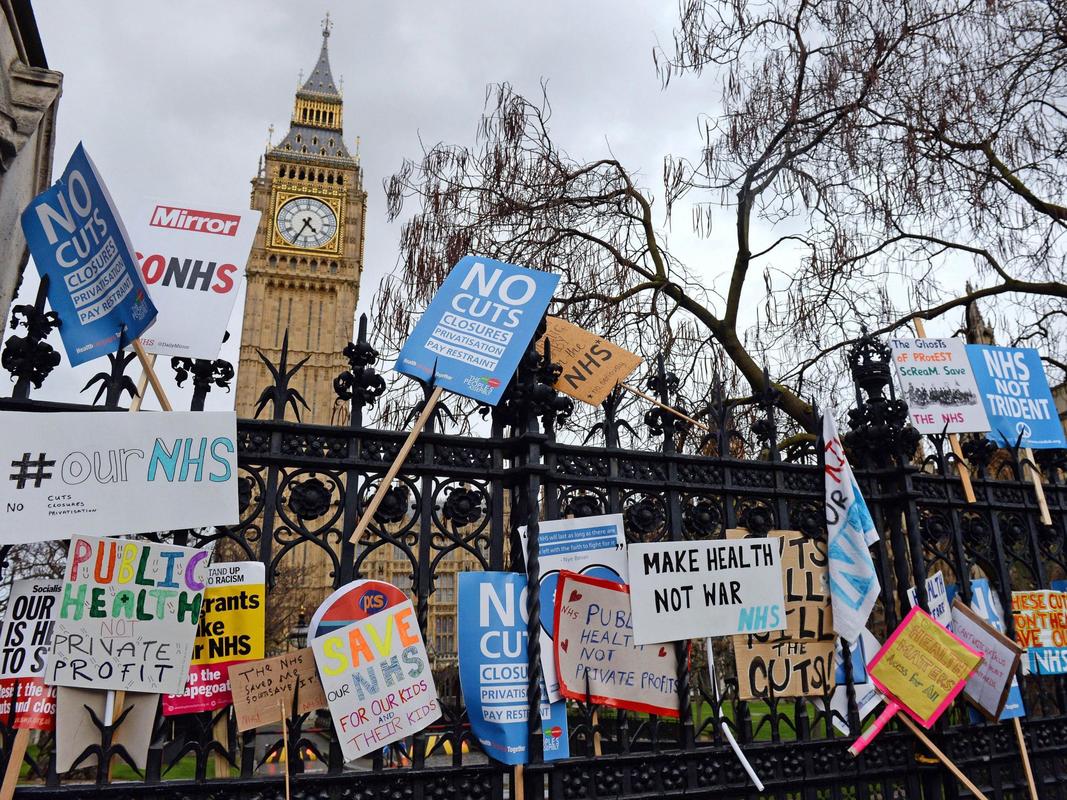|
Matt Hancock should listen to NHS staff about the impact his predecessor's decisions have had, and learn from it John Cheetham While celebrating its 70th birthday, the NHS found it had a new captain at the helm. Matt Hancock, former Culture Secretary, has been re-shuffled into the role of Health and Social Care Secretary. But in what state does Mr Hancock find the UK’s health and social care services? What aspects of these services should he look at addressing? Over the last five years, there has been an inescapable gulf between the experiences of NHS workers, and the statements given about the NHS by those at the top. PSC urge Mr Hancock to take note of the experience of NHS workers and address our concerns. After more than half a decade under his predecessor’s leadership, the NHS has never been in worse shape. Patient safety has been put at risk to such a degree that last year the Red Cross said that the NHS was in a “humanitarian crisis”. At the time, underfunding had reached such crisis levels that NHS services in North London were facing a £183m deficit, leaving 1.44 million people living under commissioners who were forced to choose service delivery options “that impact on quality of care”. Things have not changed, with a Kings Fund analysis in May showing that the NHS has one of the lowest levels of doctors, nurses and hospital beds in the western world. Yet there are those making profit from this atrocious state of affairs. Tenders are being given to private companies at a rate never before seen in the history of the NHS. Worse still, where private companies don’t win tenders, they are now suing the NHS for lost profits. During Jeremy Hunt’s tenure, the NHS as a whole saw funding increases far below what is necessary. The Department of Health’s budget is set to grow by 1.2% between 2009/10 to 2020/21, compared to the 4.3% per year increase it needs. In 2010, spending on the NHS was 8.8% of GDP. This fell to 8% in 2016 – the European average was 10.1%. This is having a huge impact on what it is possible for the NHS to provide, with targets for cancer treatments, A&E waiting times and surgery waiting times being missed for increasing numbers of patients. And yet, this government plans to cut the NHS budget back further still, to just 6.7% of GDP by 2020. This is a lower proportion than the US, Japan, Germany, France, Canada, Italy, Slovenia, Korea and Hungary spend. There have also been real-terms cuts in funding provision for mental health services, with budgets being cut by 8% between 2010 and 2015. This was felt acutely by those on the ground. At the end of 2016, just under three-quarters of consultant psychiatrists in Children & Adolescent Mental Health Services (CAMHS) surveyed said that NHS services were inadequate or very inadequate. Even when the government did release more money for mental health services in 2016, cash-strapped commissioners directed it elsewhere. The Royal College of Psychiatrists found that in some areas spending on children’s mental health was less than £10 per head, a situation it described as a “national scandal”. Despite these facts, in a statement addressed to NHS staff last summer, Mr Hunt told us that “one of the biggest expansions of mental health provision in Europe is underway right here”. We do not recognise this. Mental health trusts are depleted, not expanding. Every day we go to work we see the impact of the cuts. People who need psychiatric inpatient services to stay safe are being turned away, leaving them at risk of harm to themselves or others. Our colleagues in social care are unable to commission adequate care providers to support the most vulnerable in society, further increasing health inequalities and premature death. Indeed, the British Medical Journal have reported that in England alone there have been 120,000 excess deaths since 2010 which are directly attributable to health social care spending cuts. So, you will understand why we found Mr Hunt’s platitudes and promises nothing more than gaslighting and bluster. His rallying call that “working together, we can unite the whole NHS to deliver the safest, highest quality care anywhere in the world” is an insult to our hard work and dedication. There is only so far that working together can get us when the government aims to slash funding to among the lowest proportion of GDP in the developed world. We hope that as Mr Hancock takes over from Mr Hunt, he will take stock of the reality of this situation and acknowledge that we, the staff that are the backbone of health and social care in the UK, understand the true costs of the decisions made by his department. It would pay to listen to us. AuthorJohn Cheetham is an NHS Clinical Psychologist and a member of PSC.
0 Comments
Your comment will be posted after it is approved.
Leave a Reply. |
AuthorPSC is a network of people interested in applying psychology to generate social and political action. You don't have to be a member of PSC to contribute to the blog Archives
February 2022
Categories
All
|
PSYCHOLOGISTS FOR SOCIAL CHANGE
- Home
- About
-
Groups
- Blog
-
Position statements
- UK >
-
Cymru / Wales
>
- Consultation Responses
- Housing Support Funding
- Connecting the Dots Report
- Chemical Imbalance Myth
- Review of use of dx PD
- UK Inhumane Removal Plans
- WG LGBT+actionplan
- Ty Coryton
- Commission on Race and Ethnic Disparities: The Report
- ECT Review
- Black Lives Matter
- COVID 19 and Internet Access
- Save the T4CYP Programme
- Support the Mind over matter Report
- UN Report on Extreme Poverty in the UK Letter
- England >
- Ireland >
- Northern Ireland
- Scotland
-
Campaigns
- Join our mailing list

 RSS Feed
RSS Feed
